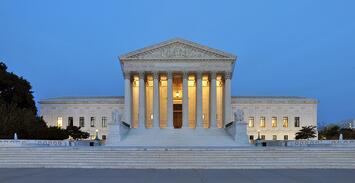
The harsh response of left-wing commentators to last week’s Supreme Court reversal of the Chevron decision reveals more about the Left than about the courts. “The Supreme Court just made a massive power grab,” blusters Ian Millhiser for Vox. “Supreme Court executes massive power grab from executive branch,” agrees Kate Riga for TPM.
In 1981, the Environmental Protection Agency under Ronald Reagan changed the definition of the word “source” (as in “source of pollution”) in one of its regulations, effectively allowing industries to pollute more with less oversight. In a case known as Chevron Oil v. the Natural Resources Defense Council, the NRDC challenged this definition and won at the district and appeals court levels. But the Supreme Court overturned this, ruling that courts should give “deference” to federal agencies in how they interpret the law. This became known as the Chevron decision and it has hampered citizen efforts to monitor bureaucracies ever since.
Congress cannot “account for every eventuality in law,” say the decision’s defenders, so it delegates its authority to the “experts” in the bureaucracies. “Judges are not experts” in fields such as pollution, said the Supreme Court in the Chevron decision, so they should defer to the people Congress and the administration has appointed as the experts who are, defenders say, “accountable to the public via the president.”
While that may sound good in a political science classroom, real life is radically different. As former NRDC attorney David Schoenbrod showed in his book, Power Without Responsibility: How Congress Abuses the People Through Delegation, Congress often passes vague laws because it doesn’t want to take the political heat for making actual decisions. Instead, it lets the bureaucracies make those decisions, allowing members of Congress to then say, “It’s not my fault; I never expected the agency to interpret the law that way.”
Moreover, the idea that the agencies are accountable to the public via the president is a joke. Thanks to civil service rules, presidents have almost no power over the agencies they theoretically oversee. When Trump supporters proposed that the president be allowed to fire up to 50,000 leaders of the 3 million federal agency employees, John Oliver lambasted them as if federal workers deserve constitutional protection. Again, Oliver’s implicit assumption is that the employees are the experts and not even the president should be allowed to question them.
Read the rest of this piece at The Antiplanner.
Randal O'Toole, the Antiplanner, is a policy analyst with nearly 50 years of experience reviewing transportation and land-use plans and the author of The Best-Laid Plans: How Government Planning Harms Your Quality of Life, Your Pocketbook, and Your Future.
Photo: Joe Ravi, via Wikimedia under CC 3.0 License.












